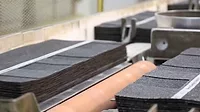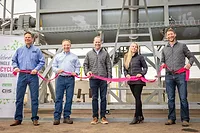Sustainability Efforts
Owens Corning Touts Progress on Shingle Recycling Initiatives

According to the Environmental Protection Agency, 11–13 million tons of asphalt shingles are torn off roofs in the U.S. annually. Less than 10% of that material is recycled into roads or other paving projects, while the remaining 90% ends up as waste in landfills.
— Image courtesy of Owens Corning; asphalt paving photo courtesy of Wikimedia
Owens Corning announced in an October 16 news release that the roofing and other building envelope materials manufacturer continues to advance toward creating a “circular shingle economy” by diverting shingle waste from landfills.
The company said it has made progress on two key shingle recycling work streams important for reaching its goal of recycling two million tons of shingles annually in the U.S. by 2030.
Recycling Used Shingles into New Shingles
In late 2022, OC and its partners launched an asphalt shingle recycling pilot program developed to deconstruct residential and industrial waste shingles and extract their component materials. In less than a year of operating, the company said its facility achieved shingle deconstruction and extracted asphalt, granules, and filler. The process is designed to reclaim the entire shingle to avoid any product components going to waste.
The materials extracted through this process have shown positive initial results, OC said, and are consistent with its initial expectations. Owens Corning and its partners continue modifying and enhancing the pilot process to optimize the resulting components for future applications.
“The progress being made at the pilot is a very promising step toward the future of shingle recycling,” said Gunner Smith, president, Owens Corning Roofing. “What started at lab scale as shingle deconstruction with benchtop materials and testing has now been proven at pilot scale; the next step is plant trials where we will utilize the extracted materials in [developing] new prototype shingles.”
In addition to creating various prototypes with recycled components for rigorous testing, OC said the company and its partners will continue to scale up the pilot facility for increased material output and evaluation.
Recycling Used Shingles into Asphalt Pavement
 Owens Corning has committed to accelerating the use of recycled shingles in asphalt paving applications, and the company has partnered with the National Center for Asphalt Technology to conduct research studies on the usage of recycled shingles in pavement.
Owens Corning has committed to accelerating the use of recycled shingles in asphalt paving applications, and the company has partnered with the National Center for Asphalt Technology to conduct research studies on the usage of recycled shingles in pavement.
The work with NCAT evaluates the performance of asphalt mixtures made with a balanced mix design using recycled asphalt shingles. It also measures the environmental impact of RAS in paving applications and will generate full lifecycle assessment data on recycled asphalt shingles into pavement for the first time. OC said the information developed would be published in industry-wide guidelines to educate asphalt contractors across the U.S.
“These studies are in progress now, and we believe the results will show a clear value proposition for hot mix asphalt contractors. With the right balanced mix design, the carbon footprint of asphalt paving mixture can be lowered while maintaining the performance of the road,” said Laurand Lewandowski, NCAT's director of Asphalt Innovation.
“Aligning ourselves with industry leaders who can [positively influence] this initiative is a significant benefit toward advancing the use of recycled asphalt shingles across the country,” Lewandowski added, “and ultimately keeping shingles out of landfills.”
For more information, visit owenscorning.com.
Looking for a reprint of this article?
From high-res PDFs to custom plaques, order your copy today!





